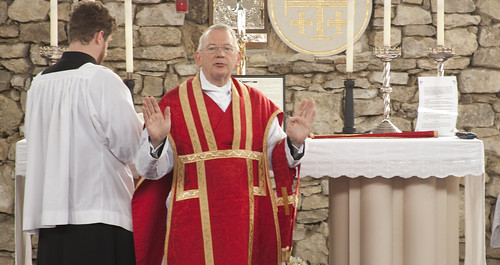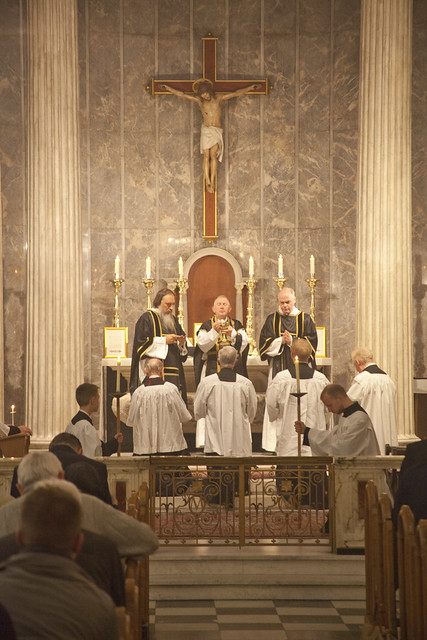Chairman's Blog
German bishops repent of the past, but not of the present
Inasmuch as the bishops did not oppose the war with a clear ‘no’, and most of them bolstered the (German nation’s) will to endure, they made themselves complicit in the war. The bishops may not have shared the Nazis’ justification for the war on the grounds of racial ideology, but their words and their images gave succor both to soldiers and the regime prosecuting the war, as they lent the war an additional sense of purpose.
Support the Latin Mass Society
A dialogue with a trans advocate
My latest on LifeSiteNews.
Holy Communion in a plastic bag?
My latest on LifeSiteNews.
It’s absolutely not possible, God deserves respect, you can’t put him in a bag. I don’t know who thought this absurdity, but if it is true that the deprivation of the Eucharist is certainly a suffering, one cannot negotiate how to receive communion. We receive communion in a dignified way, worthy of God who comes to us.
New and Old Masses in Plaguetime
My latest in the Homiletic and Pastoral Review.
Sex and shame
LMS shop re-opened; CTS booklet available
My CTS booklet, 'How to Attend the Extraordinary Form', has arrived in physical form, thanks to the efficiency of the Catholic Truth Society, whose printers and distributors have managed to keep working through the lockdown.
The Latin Mass Society has decided to mail a copy to each of the priests on our mailing list, in the UK and Ireland. That's more than 150. In the peculiar circumstances of the times this could be done most easily from my home.
At the same time I am delighted to announce that the Latin Mass Society's online shop has re-opened. We are still working almost entirely from home but we have made arrangments to be able to fulfil orders, although this may still be a little slower than normal.
So please take yourself off to our shop to buy more copies of this booklet and of all the other things we sell: members get a 5% discount, and there is a bulk discount for the booklet. (You can of course also get the booklet direct from the CTS.)
Some good, personal, news
merces, fructus ventris.
Sicut sagittæ in manu potentis,
ita filii excussorum.
Beatus vir qui implevit desiderium suum ex ipsis :
non confundetur cum loquetur inimicis suis in porta.
52nd Anniversary of the Abortion Act
Another LifeSite piece. The anniversary will be Monday 27th.
Harvard's attack on home educatioin
My recent article for LifeSite.
----------------------
Harvard Law School appears to be coordinating an attack on home-education. A planned conference appears to be intended as a pile-on by critics of homeschooling. Harvard Magazine has published an approving summary of an 80-page article in the Harvard Law Review by Professor Elizabeth Bartholet about why home-education should be banned. The Harvard Magazine account cites no dissenting or alternative views.
“We have an essentially unregulated regime in the area of elite Ed,” @docMJP asserts. All 50 states have laws that make education compulsory, & state constitutions ensure a right to education, “but if you look at the legal regime governing elite colleges, there are very few requirements that professors teach anything of value.” Even apparent requirements such as submitting curricula, or providing evidence that teaching and learning are taking place, he says, aren’t necessarily enforced.
Fr Anthony Conlon, Requiescat in pace
Fr Anthony Conlon died last night after a long illness. He had been the National Chaplain of the Latin Mass Society for many years until 2009 and continued to celebrate Masses for us in many different places.
He was a priest of Westminster Archdiocese but became Chaplain to the Oratory School, and when he retired from that he became Parish Priest of nearby Goring. This was in my own area of local activity so I often asked him to celebrate the 'occasional' Masses I organise around Oxford in odd places.
He was also for many years a Chaplain of the British Association of the Order of Malta, and in this context could be addressed as 'Monsignor'.
These photographs show him celebrating the Traditional Mass in the chapel of Milton Manor; in Our Lady of Light, Long Crendon; Our Lady and St Anne, Caversham (at the LMS annual Pilgrimage to Our Lady of Caversham); in St Mary Moorfields (for the 10 Year annivesary Requiem Mass of Micahel Davies); and in St James', Spanish Place (for the Requiem of Prince Rupert Loewenstein).
Another image of him in Milton Manor adorns the front cover our our Ordinary Prayers booklet.
We will organise a splendid Requiem for him of course: as soon as we can. In the meantime he richly deserves our remembrance and prayers.








